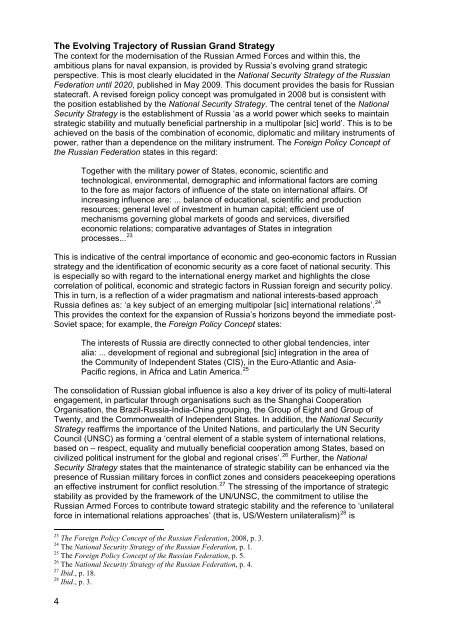The Russian Federation Navy: An Assessment of its Strategic ...
The Russian Federation Navy: An Assessment of its Strategic ...
The Russian Federation Navy: An Assessment of its Strategic ...
You also want an ePaper? Increase the reach of your titles
YUMPU automatically turns print PDFs into web optimized ePapers that Google loves.
<strong>The</strong> Evolving Trajectory <strong>of</strong> <strong>Russian</strong> Grand Strategy<strong>The</strong> context for the modernisation <strong>of</strong> the <strong>Russian</strong> Armed Forces and within this, theambitious plans for naval expansion, is provided by Russia’s evolving grand strategicperspective. This is most clearly elucidated in the National Security Strategy <strong>of</strong> the <strong>Russian</strong><strong>Federation</strong> until 2020, published in May 2009. This document provides the basis for <strong>Russian</strong>statecraft. A revised foreign policy concept was promulgated in 2008 but is consistent withthe position established by the National Security Strategy. <strong>The</strong> central tenet <strong>of</strong> the NationalSecurity Strategy is the establishment <strong>of</strong> Russia ‘as a world power which seeks to maintainstrategic stability and mutually beneficial partnership in a multipolar [sic] world’. This is to beachieved on the basis <strong>of</strong> the combination <strong>of</strong> economic, diplomatic and military instruments <strong>of</strong>power, rather than a dependence on the military instrument. <strong>The</strong> Foreign Policy Concept <strong>of</strong>the <strong>Russian</strong> <strong>Federation</strong> states in this regard:Together with the military power <strong>of</strong> States, economic, scientific andtechnological, environmental, demographic and informational factors are comingto the fore as major factors <strong>of</strong> influence <strong>of</strong> the state on international affairs. Ofincreasing influence are: ... balance <strong>of</strong> educational, scientific and productionresources; general level <strong>of</strong> investment in human capital; efficient use <strong>of</strong>mechanisms governing global markets <strong>of</strong> goods and services, diversifiedeconomic relations; comparative advantages <strong>of</strong> States in integrationprocesses... 23This is indicative <strong>of</strong> the central importance <strong>of</strong> economic and geo-economic factors in <strong>Russian</strong>strategy and the identification <strong>of</strong> economic security as a core facet <strong>of</strong> national security. Thisis especially so with regard to the international energy market and highlights the closecorrelation <strong>of</strong> political, economic and strategic factors in <strong>Russian</strong> foreign and security policy.This in turn, is a reflection <strong>of</strong> a wider pragmatism and national interests-based approachRussia defines as: ‘a key subject <strong>of</strong> an emerging multipolar [sic] international relations’. 24This provides the context for the expansion <strong>of</strong> Russia’s horizons beyond the immediate post-Soviet space; for example, the Foreign Policy Concept states:<strong>The</strong> interests <strong>of</strong> Russia are directly connected to other global tendencies, interalia: ... development <strong>of</strong> regional and subregional [sic] integration in the area <strong>of</strong>the Community <strong>of</strong> Independent States (CIS), in the Euro-Atlantic and Asia-Pacific regions, in Africa and Latin America. 25<strong>The</strong> consolidation <strong>of</strong> <strong>Russian</strong> global influence is also a key driver <strong>of</strong> <strong>its</strong> policy <strong>of</strong> multi-lateralengagement, in particular through organisations such as the Shanghai CooperationOrganisation, the Brazil-Russia-India-China grouping, the Group <strong>of</strong> Eight and Group <strong>of</strong>Twenty, and the Commonwealth <strong>of</strong> Independent States. In addition, the National SecurityStrategy reaffirms the importance <strong>of</strong> the United Nations, and particularly the UN SecurityCouncil (UNSC) as forming a ‘central element <strong>of</strong> a stable system <strong>of</strong> international relations,based on – respect, equality and mutually beneficial cooperation among States, based oncivilized political instrument for the global and regional crises’. 26 Further, the NationalSecurity Strategy states that the maintenance <strong>of</strong> strategic stability can be enhanced via thepresence <strong>of</strong> <strong>Russian</strong> military forces in conflict zones and considers peacekeeping operationsan effective instrument for conflict resolution. 27 <strong>The</strong> stressing <strong>of</strong> the importance <strong>of</strong> strategicstability as provided by the framework <strong>of</strong> the UN/UNSC, the commitment to utilise the<strong>Russian</strong> Armed Forces to contribute toward strategic stability and the reference to ‘unilateralforce in international relations approaches’ (that is, US/Western unilateralism) 28 is23 <strong>The</strong> Foreign Policy Concept <strong>of</strong> the <strong>Russian</strong> <strong>Federation</strong>, 2008, p. 3.24 <strong>The</strong> National Security Strategy <strong>of</strong> the <strong>Russian</strong> <strong>Federation</strong>, p. 1.25 <strong>The</strong> Foreign Policy Concept <strong>of</strong> the <strong>Russian</strong> <strong>Federation</strong>, p. 5.26 <strong>The</strong> National Security Strategy <strong>of</strong> the <strong>Russian</strong> <strong>Federation</strong>, p. 4.27 Ibid., p. 18.28 Ibid., p. 3.4

















